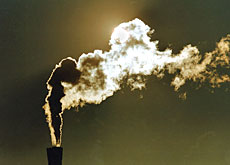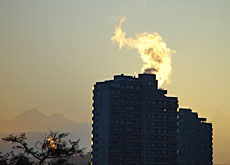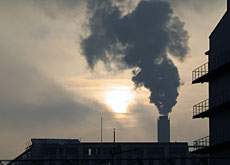Major firms seek exemption from greenhouse tax

Nearly one thousand companies have applied to be exonerated from a tax on heating oil and gas due to come into force at the beginning of next year.
The levy is part of Switzerland’s commitment to the Kyoto protocol, which aims to reduce greenhouse gases below the levels of 1990.
The 970 firms produce up to 3.5 million tonnes of carbon dioxide, which represents about 40 per cent of the annual output of Swiss industry.
The requests will be considered from next month onwards, according to the Federal Environment Office.
Parliament earlier this year approved a SFr12 tax per tonne of CO2 on heating oil. Under the regulations, companies with large energy consumption can claim for an exemption in a bid to remain competitive on international markets.
Instead they have to agree to reduce their greenhouse gas emissions in Switzerland and abroad.
“It gives multinational companies the possibility of taking measures where it is the most profitable, allowing firms to spread them over different sites using emissions trading and other mechanisms,” said Andrea Burkhardt of the Federal Environment Office.
At the beginning of next year companies will be allowed to trade emission certificates, including those acquired from abroad.
Both the environment office and the Federal Energy Office believe that Swiss companies will not suffer from a competitive disadvantage with the introduction of the tax.
“There are many other countries that have introduced this kind of tax,” Burkhardt told swissinfo.
“In Scandinavia for example, the Netherlands; in Britain, there is a climate change levy; and Germany, our major trading partner, introduced green tax reform a few years and has implemented all kinds of taxes on energy and fossil fuels.”
With its focus on heating oil, individuals will also be affected by the tax.
“The pricing sends a strong signal to individuals,” added Burkhardt. “It tries to make them a little aware about their energy use and that they can influence it substantially, regardless of whether they own their home.”
The tax revenue will be redistributed to industry and to citizens as of 2010. Each inhabitant should receive a SFr16 rebate on their health insurance, while non-exempt companies should get SFr37 per SFr100,000 of salaries paid out and subject to the federal pension scheme.
“Climate centime”
The CO2 tax is one of several tools aimed at reducing by 2012 harmful greenhouse gases by eight per cent compared with 1990 levels.
A non-mandatory levy, known as the “climate centime”, was introduced on petrol and diesel for cars on October, 2005.
However, the measures are unlikely to be sufficient to reach the Kyoto goals, according to the authorities. The head of the environment office, Bruno Oberle, said that solutions still have to be found for half a million tons of CO2 emissions.
The cabinet is due to discuss further steps, proposed by Environment Minster Moritz Leuenberger, in the next few weeks.
The extra measures include financial benefits for owners of low emission cars and buildings.
swissinfo with agencies
The Swiss parliament ratified the Kyoto Protocol on climate change in 2003. Switzerland undertook to reduce its CO2 emissions to 10% less than 1990 levels by 2010.
However, some experts are doubtful that this target will be met. In 1990 greenhouse gas emissions stood at 53.3 million tonnes; in 2000 they were 52.7.
A CO2 law came into force in 2000 to ensure that the Kyoto target was achieved. About a thousand enterprises have taken voluntary measures measures to reduce their emissions.
But it became clear by 2005 that these measures were not sufficient. It is proving difficult, however, to agree on how to strengthen them.
Forty-seven researchers in Switzerland say that if the climate is to be stabilised, abandoning fossil fuels is unavoidable .
On Monday, they presented a study paper “Rethinking energy” to the Federal Energy Office to encourage leaders from the economy, the world of science and politicians to discuss the problems of the use and global supply of energy.
The scientists argue that CO2 emissions should be lowered to just one sixth of today’s levels by 2100.
They also say that energy challenges are not a threat but an opportunity for Switzerland to assert itself internationally.

In compliance with the JTI standards
More: SWI swissinfo.ch certified by the Journalism Trust Initiative



You can find an overview of ongoing debates with our journalists here. Please join us!
If you want to start a conversation about a topic raised in this article or want to report factual errors, email us at english@swissinfo.ch.